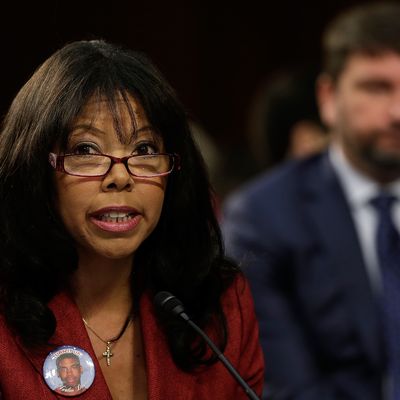
On April 27, longtime National Rifle Association president Oliver North resigned under pressure in the midst of New York Attorney General Letitia James’s investigation into the organization’s tax-exempt status. The new president, Carolyn Meadows, did not take long to embroil the group in a new controversy.
On Sunday, the 80-year-old Georgia native told the Marietta Daily-Journal that the reason freshman Representative Lucy McBath defeated Republican Karen Handel was not her appealing gun-control message — including legislation requiring background checks for all gun purchases. “We’ll get that seat back,” Meadows told the paper. “But it is wrong to say like McBath said, that the reason she won was because of her anti-gun stance. That didn’t have anything to do with it. It had to do with being a minority female.”
The quote, already tone-deaf at the very best, is made worse by the reason for McBath’s turn to politics. In 2012, McBath’s 17-year-old son, Jordan Davis, was murdered at a gas station in Florida following an argument over the volume of music Davis and his friends were playing. The man who shot Davis, and was eventually convicted of first-degree murder, attempted to use the NRA-written Stand Your Ground law as his legal defense.
In November, McBath won a tight victory over Karen Handel in Georgia’s Sixth Congressional District — the site of the most expensive congressional race in U.S. history in 2017. On Monday, McBath responded to Meadows in a moving Twitter thread:
Also on Monday, Meadows apologized to McBath for her comments, which she admitted were “insensitive and inappropriate.” But other recent moments in Meadows’s career suggest that she may not absorb the political or racial sensitivity lessons of this teaching moment. On April 30, Meadows said in an interview with the Atlanta Journal-Constitution that she promised to endorse whomever the GOP nominated to defeat McBath in 2020. And in 2015, Meadows led an organization that blocked a proposal that would construct a monument to Martin Luther King Jr. on Georgia’s Stone Mountain — where a bas-relief sculpture of Confederate leaders dominates the mountainside and where the second Ku Klux Klan was founded in 1915.






























